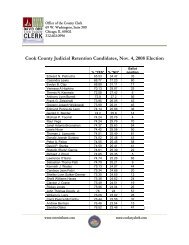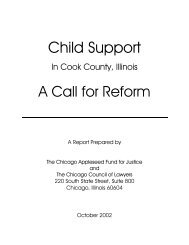Videoconferencing in Removal Hearings: A Case Study of the ...
Videoconferencing in Removal Hearings: A Case Study of the ...
Videoconferencing in Removal Hearings: A Case Study of the ...
You also want an ePaper? Increase the reach of your titles
YUMPU automatically turns print PDFs into web optimized ePapers that Google loves.
egularly witnessed attorneys and clients becom<strong>in</strong>g frustrated because <strong>the</strong>y had no<br />
privacy. In one observed hear<strong>in</strong>g, an attorney asked to speak to <strong>the</strong> immigrant <strong>in</strong> private.<br />
In this case, <strong>the</strong> trial attorney left <strong>the</strong><br />
courtroom, although o<strong>the</strong>r court <strong>of</strong>ficials did<br />
not. The detention <strong>of</strong>ficer at Broadview did<br />
not leave <strong>the</strong> room ei<strong>the</strong>r. Observers never<br />
40<br />
The vast majority <strong>of</strong> lawyers<br />
believed that private conference<br />
was impossible. Observers<br />
regularly witnessed attorneys and<br />
clients becom<strong>in</strong>g frustrated<br />
because <strong>the</strong>y had no privacy.<br />
saw a judge outright deny a lawyer’s request to speak with <strong>the</strong> client privately.<br />
In most cases, <strong>the</strong>se impediments to attorney-client communication seemed to<br />
slow <strong>the</strong> hear<strong>in</strong>g process. One attorney expla<strong>in</strong>ed that he would never ask a question or<br />
do anyth<strong>in</strong>g else <strong>in</strong> court that he and his client had not discussed beforehand. S<strong>in</strong>ce <strong>the</strong><br />
lawyer and his client could not speak privately dur<strong>in</strong>g <strong>the</strong> hear<strong>in</strong>g, <strong>the</strong> lawyer would ask<br />
for a cont<strong>in</strong>uance if any unexpected issues arose, thus slow<strong>in</strong>g <strong>the</strong> overall pace <strong>of</strong> that<br />
immigrant’s case. In most cases, attorneys would ask for a cont<strong>in</strong>uance or for a merits<br />
hear<strong>in</strong>g. In a small number <strong>of</strong> cases, observers saw <strong>the</strong> outcome <strong>of</strong> <strong>the</strong> immigrant’s case<br />
actually chang<strong>in</strong>g <strong>in</strong> <strong>the</strong> course <strong>of</strong> a videoconferenc<strong>in</strong>g hear<strong>in</strong>g, as <strong>in</strong> <strong>the</strong> follow<strong>in</strong>g<br />
example:<br />
The immigrant decided dur<strong>in</strong>g <strong>the</strong> hear<strong>in</strong>g to just accept <strong>the</strong> charges and return to<br />
his country. At that, <strong>the</strong> attorney requested to be relieved, and <strong>the</strong> immigrant<br />
granted his wish. I wonder whe<strong>the</strong>r th<strong>in</strong>gs would have gone differently if <strong>the</strong> two<br />
had a chance to speak <strong>in</strong> private.<br />
Interpretation Problems<br />
Language <strong>in</strong>terpretation is a serious problem <strong>in</strong> <strong>the</strong> Chicago court, and<br />
videoconferenc<strong>in</strong>g exacerbates it. Observers witnessed <strong>in</strong>terpretation problems <strong>in</strong> 14% <strong>of</strong>




